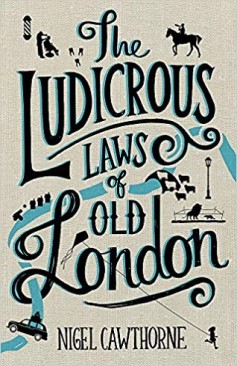The Ludicrous Laws of Old London
By Yi Li Alyssa Tjioe
Published on October 12, 2018

In his author’s introduction on the very first page of this book, Nigel Cawthorne states that he “now spends all hours, six days a week in the Reading Rooms of the British Library”. Given the comprehensiveness of this book – which this reviewer is disinclined to fact-check due to the obscurity of these laws and historical events– one would hardly dare suspect otherwise.
Cawthorne isn’t, however, just a reader. His experience as a writer shows in the masterful treatment of what would otherwise be relegated to the “trivia” shelves.
For example, he starts the first chapter, “The Wonders of Westminster” with a bit of bloodshed in order to introduce the parliamentary dress code, before adding a couple of fairly humdrum facts about no eating or drinking, no reading of speeches or calling of names… And then, just when one thinks they’ve found a perfect bedtime story, Cawthorne throws in the “no dying” rule complete with an explanation of what happens to anyone who dares die in Parliament and how this was related to the inquest into the death of Princess Diana.
It is this grasp of timing, a sharp sense of humour, and a storyteller’s ability to condense complicated events and reports entertainingly that livens up The Ludicrous Laws of Old London. It surely looks like a laundry list of facts, but it can absolutely be read continuously, as if it were a novel. Additionally, with his extensive research, Cawthorne constantly manages to link historical events and explain the reasoning behind archaic and seemingly nonsensical laws. For instance, what does religious freedom in England have to do with laws allowing refreshments for jurors? What does a ghost have to do with the laws on manslaughter? What does the writ of habeas corpus have to do with a house party?
In this subtle manner, Cawthorne’s book provokes thought and invites the reader to be curious, while remaining entertaining.
This book will be an engaging read for anyone interested in London, history, journalism or, of course, law and politics. It would also be a useful book for a tour guide, and a wonderful gift for any visiting friends.
The Author

Yi Li Alyssa Tjioe is an Associate Editor with the international law magazine, The New Jurist. An undergraduate at the University of Leeds, Alyssa is an aspiring lawyer. She is currently interested in researching arbitration law, international trade law, and environmental sustainability.


